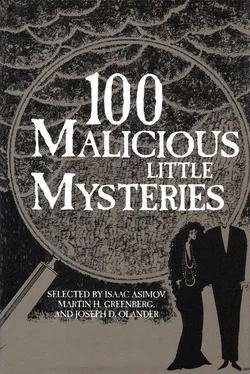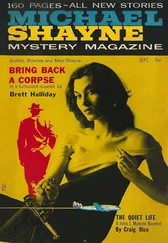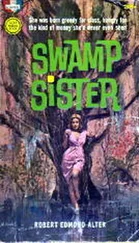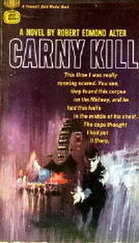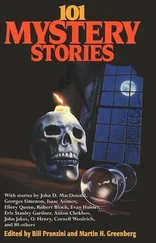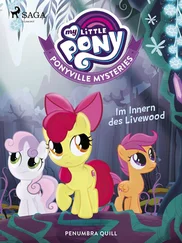That evening at home, while Constance chatted on the telephone with some friend, William Willis glanced over the cupboard shelves, inspecting the canned goods. There were two cans of peaches, and one of them was Can o’ Gold. His heart skipped a beat as he peered in at the lot number embossed on the lid. It was lot 721/XY258. Studying it more closely, he noticed that the can was bulging a trifle — an almost certain sign of gases produced by the bacterial activity inside.
There, standing on a shelf in the cupboard, was one of the deadly cans of peaches.
He said nothing to Constance, but that night in bed the possibilities paraded through his mind. All he had to do was say nothing, and sooner or later Constance would eat the contaminated peaches and die of botulism. Everyone would be most sympathetic. No one would suspect a thing.
And William Willis would be a free man.
He rolled over on his side and gazed into the darkness, thinking of Rita Morgan downstairs.
On his way out in the morning he saw Rita washing her car with a hose. “Hello, there,” he called out. “I didn’t think teachers ever got up this early in the summertime.”
“I’m going on a picnic,” she answered, beaming a smile his way. “Trying to get some of the dirt off this thing first.”
“If I didn’t have to go to work I’d help you out.” He stood chatting with her for another few moments, until he noticed Constance watching them from an upstairs window. “Gotta be going,” he said finally. “Be seeing you.”
That day in the office he tried not to think about it. But after lunch, while reading the latest newspaper account of the can recall, he let the idea of murder cross his mind.
If Constance died from eating those peaches, was he guilty of murder?
No, no — he refused to accept that. He had not even touched the can. Constance had purchased it, Constance would open it, Constance would eat it — possibly during the day when he wasn’t even at home. How could it be his fault?
Accident. Or death by misadventure, as the British liked to say. But certainly not murder.
William Willis went back to work and tried not to think of the can of peaches waiting on the shelf for Constance.
When he got home that evening the first sight that greeted him was Constance sitting at the kitchen table eating peaches and ice cream.
“Won’t that spoil your dinner, dear?” he asked a bit stiffly.
“It’s too hot to cook dinner in the apartment. I thought we might just go out for a sandwich later. All right?”
On any other night he might have grumbled, but this evening he simply said, “Sure,” and walked behind her back to the cupboard. The Can o’ Gold peaches were still on the shelf. She was eating the other brand.
They talked very little that night and for the first time in many years he found himself getting through the hours with Constance without feeling the old hatred. When they returned from dinner, Rita came upstairs to borrow some milk, and Constance greeted her in a friendly fashion and even invited her in for coffee. Willis went to bed that night feeling good.
The feeling persisted the next day at the office and he wondered if he might be mellowing toward Constance. He made a point of buying the New York and Chicago newspapers, where the story of the botulism scare was still very much alive on the inner pages. One paper carried a detailed account of the boy’s death agonies, of the gradual impairment of various parts of his brain until finally he simply stopped breathing. Willis read it grim-lipped, imagining Constance as she might be during those long hours of dying.
He grabbed the telephone and dialed his home number, but the line was busy. She was chatting with a girl friend again.
His hands were trembling when he put down the phone, and he knew he must get a grip on himself. He’d been only an instant from warning her, from telling her of the contaminated can and thereby revealing the dark presumptions that had run through his mind. He must control himself. He was not a murderer. He was not even an instrument of chance.
And yet — if Constance died would he ever be able to look at himself in a mirror again? Would he ever be able to love Rita Morgan without the memory of Constance’s death to haunt them?
He picked up the phone and dialed his number again. The line was still busy.
“I have to go home,” he told his secretary. “Emergency.”
He got the car out of the lot and headed for the expressway. It was nearly midafternoon and he knew she sometimes had her peaches about this time of the day. The drive home seemed longer than it had ever been at rush hours. Driving fast, almost recklessly, he imagined finding her stretched out dead on the kitchen floor — even though he knew from the newspaper articles that botulism took several hours to show its first symptoms.
He turned into the drive next to the apartment house and parked in his usual spot. The second-floor window of his apartment seemed the same, the place itself seemed unchanged. Perhaps he’d made the drive for nothing, and he’d have to explain it to Constance. And somehow get that can out of the house.
“Dear! I’m home early!”
There was no answer and he went into the kitchen seeking her. The first thing he saw was the open, empty, discarded can of Can o’ Gold Fancy Prepared Peaches by the sink. That, and an empty dish, with its dirty spoon and telltale juices.
“Constance!”
She appeared then, coming from the bathroom. Her face was pale and somehow a little strange. “What are you doing home?” she asked.
“I wasn’t feeling well.”
“Oh.”
“Constance, did you eat those peaches?”
She glanced at the empty dish and the discarded can by the sink. Then her eyes met his and there was something in them he’d never seen before.
“Oh, no, dear. That nice Miss Morgan came up to borrow something, and she stayed and chatted, and I persuaded her to have a little snack.”
Thirteen
by Edward D. Hoch
Renger looked up from the crude map on the table before him and studied the newcomer with critical eyes. “You’re Hallman?”
“That’s right.”
“They tell me you’re a good man with a gun.”
“I get by.”
“Then I guess you’re the man we need for this job. Ever used an automatic carbine?”
“Plenty of times.”
“Like this one?” Renger asked, bringing out a new Plainfield carbine very much like the standard military weapon. “It uses thirty-shot clips. All right?”
“Fine.” Hallman glanced around at the five other men in the room. The only one he knew was Asmith, a part-time heroin pusher who’d been in and out of prison. He nodded to him and waited for Renger to introduce the others.
“That’s Crowthy and Evans and Asmith and Galliger and Yates. A damn good team for this job. But we needed a good man with a gun — somebody who’s not afraid to use it.”
“That’s me,” Hallman said. He had earned the reputation.
“Good! We’ll have smoke bombs and stuff, but I’m not kidding myself that we’re going to get in there without killing a few people.”
“What about guards?” Hallman asked. “And patrol cars?”
Renger pushed back his graying hair and stabbed at the map with a pencil. “The only guard you need to worry about is right here. Take him out and it’s smooth sailing. Now, a patrol car comes down this street about once every hour. We’re timed to miss it, but we can’t be sure. All I can tell you is that Crowthy here will be covering you from across the street. If the patrol car surprises us, you’ll have to deal with it.”
“I understand,” Hallman said.
“Your job is to take out this guard, get into the place, and fire a few shots. Create confusion. Make them think we’ve got a whole army out here. Then I’ll toss a few smoke bombs and the rest of us will move in.”
Читать дальше
